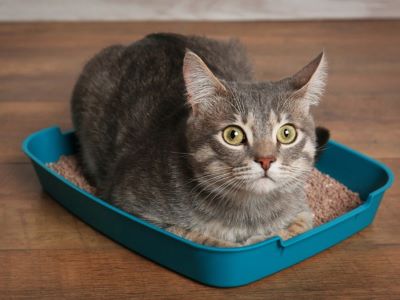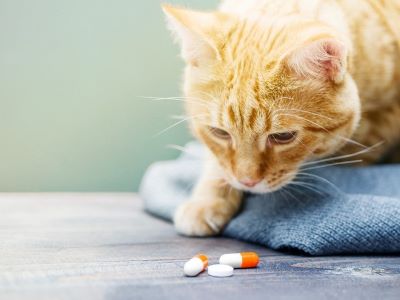Giardia is a microscopic parasite that can affect a wide range of animals, including cats.

This article aims to shed light on the causes, symptoms, and treatment choices for Giardia in cats.
Understanding this common parasitic infection can help cat owners provide appropriate care and minimize the risk of transmission.
What Is Giardia?
Giardia is a single-celled parasite that can infect the small intestines of both humans and cats.
It is spread by fecal-contaminated water, food, or soil. It is more common in kittens and adult cats with compromised immune systems and can easily crop up in densely populated groups of cats in places like shelters and pet stores.

As per the experts at VCA, “It is a simple one-celled parasitic species, not a worm, bacteria, or virus. The parasite occurs worldwide and is a common cause of “Traveler’s Diarrhea” in people”.
Symptoms of Giardia
Giardia infection in cats differ in severity, here are some common symptoms:
- Diarrhea
- Weight Loss
- Vomiting
- Lethargy, Less energy
- Dehydration
- Frequent trips to litter-box
- Excess gas
- Decreased appetite
Causes of Giardia
Cats typically come in contact with Giardia by ingesting cysts from contaminated water, food, or soil.

The cysts are resilient and can survive for long periods outside the host. Cats housed in crowded or unsanitary conditions, such as catteries or shelters, are at a higher risk of infection.
Additionally, cats that come into contact with infected animals or their feces are more likely to contract Giardia. The parasite can cause severe gastrointestinal disease.
Treatment of Giardia
Always consult a professional, the vet will help you to determine the right treatment. It is essential to follow the prescribed treatment plan and complete the entire course of medication to ensure effective eradication of the parasite.
The two most common drugs used to kill giardia are fenbendazole and metronidazole.

These medications can be very bitter, so they are often manufactured in a coated tablet form. To get the correct dose for cats, the tablet must often be split, thus exposing the bitter contents.
To make it easier for them to consume flavored formulas can be used to prepare them to mask the bitterness. The treatment is given orally for five to seven days.[1]
Because Giardia cysts are infective immediately when passed into the environment, feces should be removed quickly and disposed of. Infected animals should be bathed regularly to remove cysts from the fur coat.
Recovery From Giardia
According to the experts at VP, “After infection, it takes 5 to 16 days in cats for Giardia to be found in the host’s stool. Diarrhea can precede the shedding of the Giardia“
Once a cat gets infected with Giardia, it takes about 1 to 2 weeks for its body to show a reaction. The sooner they accept medicine, the faster they can start healing.
Typically, it takes around 3 to 5 days for the parasite to be eradicated from the stool, and it may take 5 to 7 days for the symptoms to go away.
It’s important to complete the entire prescribed medication, even if the symptoms seem to improve halfway through treatment. Stopping the medication early could potentially lead to the giardia parasite becoming resistant.
Prevention
Here are some tips to prevent further infection:
- Practice good hygiene by washing hands entirely after handling cat litter or coming into contact with feces.
- Regularly clean litter boxes, food and water bowls, and living areas to minimize the potential for contamination.
- Provide cats with clean, fresh water from a safe source to prevent ingestion of contaminated water.

- Avoid contact between your cat and potentially infected animals or their feces.
- Schedule regular veterinary check-ups to monitor your cat’s health and address any potential issues promptly.[2]
FAQs
How Serious Is Giardia in Cats?
What happens if Giardia goes untreated in cats? Cats can have painful cramping and diarrhea as well as dehydration and other symptoms if Giardia is not treated. In kittens or smaller cats, Giardia can cause death from dehydration.
What Naturally Kills Giardia in Cats?
Prevent and kill parasites: Coconut oil can even kill giardia, one of the nastiest bugs affecting dogs and cats. It can also kill fleas when rubbed on problem areas and allowed to set in. Condition coat: Rub a dab of coconut oil between your palms then give your pet a good massage.
What Is the Fastest Treatment for Giardia?
Metronidazole is the most common medication given for the treatment of giardia. It is an antibiotic that attacks the parasite and helps the dog’s body recover more quickly.
Is Giardia Life-Long?
Occasionally, people with giardiasis will have long-term complications such as reactive arthritis, irritable bowel syndrome, and recurring diarrhea that can last for years.
Is Giardia a Big Deal?
Giardiasis can cause minor to severe digestive symptoms, such as loose, runny stools and stomach cramps. The Giardia parasite can live outside the body for a long time. It can survive in water or food and on surfaces such as doorknobs.
Summary
Giardia is a common parasitic infection that can affect cats, leading to gastrointestinal symptoms and distress.
The immediate diagnosis and proper treatment are essential to help infected cats recover and prevent transmission to other animals or humans.
By practicing good hygiene and providing a clean and safe environment, cat owners can reduce the risk of Giardia infections and ensure the overall well-being of their feline companions.
Always consult the vet for professional advice regarding your cat’s health and treatment options.
Reference:

Patricia is a guardian to an exotic shorthair cat named Suz. She’s a professional cat trainer and behaviorist. She has expertise in writing on feline behavior, house training, and tips & tricks including product reviews of related products.

